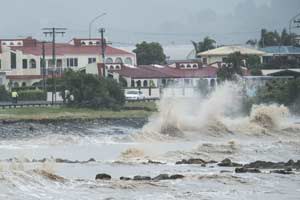Representing our communities – auditing councils’ climate change information
 You feel the weight of responsibility when auditing a council’s long-term plan (LTP). Each one is a public document, showing how a council will use funds on its ratepayers’ behalf, so our audits need to give everyone confidence that each LTP is grounded in good evidence. This includes how each council has explained how they are tackling the effects of climate change on their communities.
You feel the weight of responsibility when auditing a council’s long-term plan (LTP). Each one is a public document, showing how a council will use funds on its ratepayers’ behalf, so our audits need to give everyone confidence that each LTP is grounded in good evidence. This includes how each council has explained how they are tackling the effects of climate change on their communities.
Auditors ensure that there is evidence to support what councils say in their LTPs and that they are setting emissions targets and committing to infrastructure investments that are realistic in the next 10 years.
The public demand for this kind of information is increasing, so it needs to be transparent, meaningful, and understandable. I put myself in the ratepayer’s shoes when I’m auditing climate change information – I’m there on the public’s behalf, and recent severe weather events have brought this home in a very real way.
Severe weather underscores the need for action on climate change, and this is leading to a shift in the local government sector. We’ve seen some progress in annual reports from councils and council-controlled organisations (CCOs). The number of councils and CCOs reporting against targets for greenhouse gas (GHG) emissions have been increasing steadily over the last few years.
This is an evolving area, with challenges for organisations wanting to collate and report high-quality information. Reporting is especially difficult for councils when they need to shift time, effort, and funds towards rescue operations or repairs due to extreme weather events. Also, providing reliable evidence about GHG emissions is challenging.
“Scope 3” emissions, for example, are generated by transport and other activities related to the supply chains for goods and services. A council generally can’t control scope 3 emissions and will therefore find it difficult to collect reliable evidence about them.
However, it’s encouraging when we see organisations making a start, being pragmatic, and setting goals with the information they have. It’s possible to learn from the experience of those who have already begun their climate change reporting journey and who have been improving their reporting systems.
I’m hopeful that we’ll continue to see progress in the quality of reporting across our public sector. By the first week of July 2024, most councils had adopted their audited LTPs for 2024-2034. Within the scope of our auditing, we are seeing more focus in these plans on reducing greenhouse gas emissions and strengthening infrastructure. So, we hope to see this further reflected in council annual reports for 2024/25.
On behalf of our communities, my colleagues and I will continue to keep an eye on climate-related information in public reporting.
1: When public organisations report climate-related measures in their audited performance information, auditors are required to provide reasonable assurance that the information is free from material misstatement.
